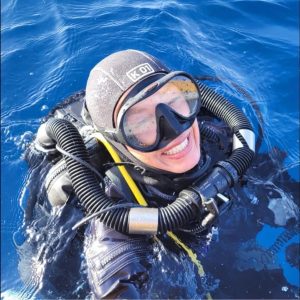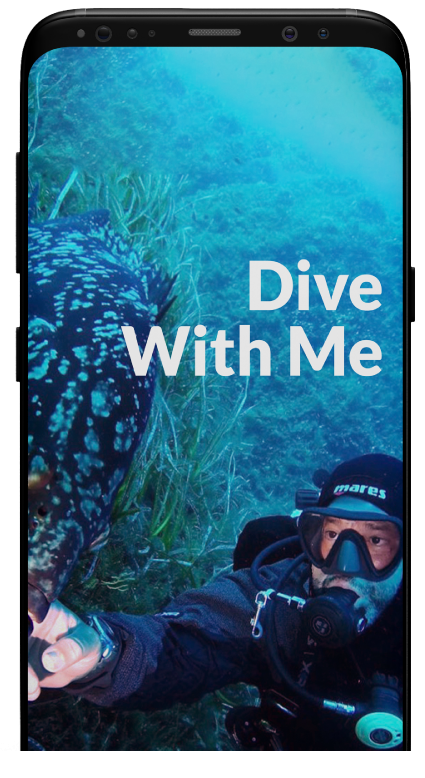The benefits of diving: psychophysical health and sociality.
Mental well-being, stress reduction, physical well-being but above all, the possibility of being part of the diving community.
A few years ago, a French study compared the benefits of outdoor physical activity with those of indoor activities. The results have shown that practicing outdoor physical activity, at least once a week, increases mental well-being by 50%, reduces stress and insomnia.

UCPA, in 2017, conducted another study between a group of people who practiced land-based activities during the weekend and another group who practiced scuba diving. This research has shown a significant reduction in the level of stress over a month, especially for divers.
Contemplation, exploration, relaxation, adventure.
These are terms often used by those who practice diving and therefore demonstrate the development of a state of full consciousness. A state that allows you to focus on the present moment and get rid of negative thoughts.
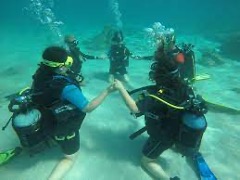
In a previous article, I told you about a study conducted on the concept of diving as a healing activity. And of instructors trained to accompany victims of post-traumatic stress, through behavioral and cognitive therapies.
The Handisub® program for disabled divers demonstrates the great positive impact on the quality of life and well-being of disabled divers. During the dive, the person in a wheelchair regains a certain freedom of movement. They move in a three-dimensional space and manage to perceive imperceptible sensations out of the water.
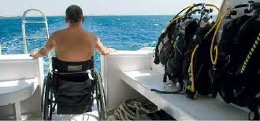
Social benefits
The legislation relating to sporting activities, both national (Department for Sport and Youth) and European, aims to promote social cohesion. And to transmit important values, such as tolerance and mutual respect, through the practice of sport.
Sport becomes a training and educational tool for the individual and the community and not a simple means of achieving psycho-physical well-being. Its practice contributes to preventing and combating discrimination phenomena, promoting a culture of positive social values.
Sporting activities promote, through confrontation, interaction and positive competition, inclusion and dialogue between individuals, the promotion of equal treatment and social cohesion.
At the European level, since the entry into force of the Treaty of Lisbon in 2009, the European Union has acquired specific competence in the field of sport, supporting the actions of the Member States in the field of sport.

The new EU Work Plan for Sport, in particular, highlights integrity in sporting practices, the development of skills and competences, health promotion and volunteering. With the slogan: “education in sport and through sport”.
Furthermore, the indisputable social role of sport must also be linked to environmental sustainability.
Scuba diving: an obvious vector of socialization
The social dimension of outdoor sporting activities represents an important way to enhance oneself. To evaluate oneself in relation to others, thanks to mutual help and attitudes based on solidarity.
Diving, on the other hand, allows you to build your own autonomy in the water through collective action. Beginners learn to acquire mental and physical skills along with a specific communication code. These skills allow them to develop a sense of responsibility and respect for safety rules, necessary and indispensable for evolving in an environment different from his own.
In fact, the diver, during his long training course, will understand the need to establish a relationship of trust with his team and above all with his dive buddy. And thanks to this learning he will have the opportunity to establish bonds from which, often, sincere and lasting friendships born.

And let’s not forget that diving is also a powerful educational tool that allows you to transmit values and ensure respect for the environment through participatory science. In constant development, the interventions carried out by amateur and non-profit associations, involving collaborative citizens and voluntary divers, contribute to the knowledge and protection of the environment, and therefore to the common good.
Physical benefits: The Blue health!
Because underwater is not like the above, diving is a physical activity of resistance and moderate intensity but of prolonged duration.
Musculoskeletal system
As far as the musculoskeletal system is concerned, thanks to the resistance of the water, the practice tones all muscle groups without overloading the joints.
The effort is relative weightlessness therefore limits trauma and joint stress. In addition, the activity builds lower body musculature through the use of the fins, and helps shape the abs, glutes and back.
For people with motor disabilities, immersion reduces painful muscle spasms, thus improving the quality of everyday life.
Cardiovascular system
Even the cardiovascular system benefits from diving: thanks to constant practice, we notice a reduction in heart rate during effort. However, this is only possible if the diver is in conditions suitable to dive in optimal situations and in a thermal comfort zone.
Cardiac activity is clearly more stressed during diving (physiological stress) than an equivalent metabolic expenditure on land, especially in the case of demanding and off-curve dives.
Hence the importance of an adequate preventive medical check-up and of a practice that takes into account both the individual and the diving conditions.
Sensory activities
From a sensorial point of view, the modifications of kinesthetic, proprioceptive and vestibular sensations in relation to balance offer a particular experience in space.
The same goes for auditory and visual changes: all this helps to enhance our meditative ability during but also after the dive.
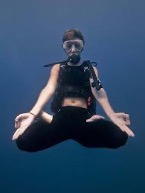
Respiratory System
Finally, as far as the respiratory system is concerned, awareness of one’s breathing is one of the great advantages of diving. The benefits of diaphragmatic breathing are found in diving where the conscious perception of exhalation is of great importance especially with regard to relaxation and stress management.
Cardiorespiratory coherence therefore facilitates resilience and is similar to meditation techniques, often recommended for those who practice underwater activities.
In light of all the benefits described above, a doctor’s prescription for wearing fins and a wetsuit seems essential!
Fonte: https://ffessm.fr


